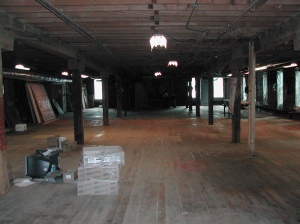You'll hear a lot of talk about the "death of the public library" these days. It isn't simply the perpetual budget crises that many face either. It's the move to digital literature, and the idea that once there are no more print books (or rather if there are no more print books), the library as an institution will cease to exist.
Librarians will remind you, of course, that a library is much more than a book repository. It's an information center (free and open information, I should add). It's an educational center. It's a digital access center. It's a community center. It's fairly clear when you describe the library like this that none of these roles are going away (nor should they), no matter what format our reading habits may move to.
But these new formats will indeed change libraries -- how they operate as well as how they look. As our books become digitized, there may be less need for row upon of bookshelves. And as such, that's a great opportunity for libraries to re-think how to use that space.
Earlier this year, MAKE Magazine's Phillip Torrone wrote a provocative article asking "Is it time to rebuild and retool libraries and make 'techshops'?" In other words, should libraries join some of the other new community centers that are being created (such as General Assembly which we covered yesterday) and become "hackerspaces" or "makerspaces"?
"Yes!", says librarian Lauren Smedley, who is in the process of creating what might just be the first maker-space within a U.S. public library. The Fayetteville Free Library where Smedley works is building a Fab Lab -- short for fabrication laboratory -- that will provide free public access to machines and software for manufacturing and making things.

So far, the Fab Lab is equipped with a MakerBot, a 3D printer that lets you "print" plastic pieces of your own design. The potential for 3D printers to revolutionize manufacturing as we know it is huge: imagine being able to design and then manufacture -- or "print" -- whatever you want. Moreoever, imagine the tools of manufacturing being in the hands of everyone, not just giant factories (and remember, since this is a public library, this is really putting the technology in the hands of everyone, not just those that can afford a membership at a traditional hackerspace).



